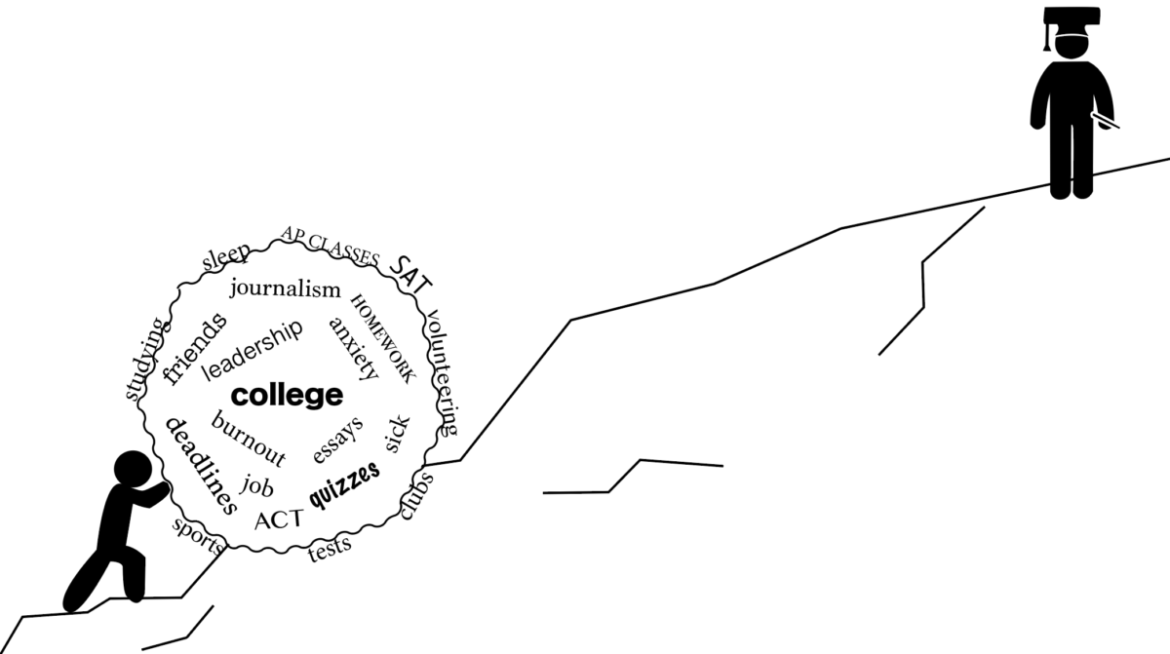Tahlia Scherer, Features Editor
@tscherercourant
It’s that time of year again: flowers are blooming, the sun stays high in the sky well past six o’clock, and college decisions are being finalized. For college bound seniors it is a time of excitement and joy, for everyone else, it’s both a reminder and a trigger of the perpetual stress that high school students face surrounding college decisions.
Although many may find that college-related stress is unbearable, senior Robbie Hellman believes that the stress that comes about through college applications, while hard to cope with, is a necessary part of life. “It’s a really stressful time but it’s also a time of learning. It’s an important process to go through, and even though it’s stressful, it really prepares you for the real world. There’s going to be a lot of applications in life whether it be for jobs or for grad school, it’s just part of the process.”
For freshman Niyathi Iyengar, stress surrounding school begins at an early age and is especially heightened at the beginning of high school. “From a young age, students feel a pressure to ‘get good grades’. They are afraid that they won’t live up to expectations, whether it’s their family’s or their own.” She continues, “From the very beginning of high school, college applications become an inseparable part of many students’ lives. Suddenly, everything comes with an opportunity cost: will I be able to finish my homework if I go to town with my friends? Will I be able to attend FCIACs if I go on break with my family?”
The stress that surrounds applying to college affects all aspects of students’ lives, from the classes they choose to take to the activities they take part in outside of school. Guidance counselor Mrs. Vernon says, “Students know that colleges really direct students to have some AP classes. Students know that the rigor of their classes is important so they will take those APs.”
The process students undergo on the route to college forces high schoolers to make certain sacrifices. “The process forces students to optimize their time, but it also forces teenagers to take on the responsibilities of adults, making complex decisions which determine outcomes far in the future. As a result, high schoolers often come home from school stressed and anxious, and college applications may well be a part of the problem,” said Niyathi.
Many students feel pressure to take certain classes in order to impress colleges. “I tried to take classes that I was interested in, but as I learned more about the college process, I realized that rigor is a really important part of it. Even if your GPA drops 1 or 2 points, rigor is a really important part of what colleges look at. I tried to take as many AP’s as I possibly could, which sucked, it was so stressful, but it worked out,” said Robbie.
“Though I know that coursework isn’t everything when it comes to the admissions process, it certainly plays a large role in determining if a student is capable of handling a more challenging and rigorous college life,” Niyathi said.
While many students admittedly take certain classes for the sake of impressing colleges, it seems that their participation in extracurricular activities is anything but superficial. For sophomore Siddhi Singhania, who spends her time outside of school volunteering at the Stamford hospital in addition to playing the piano and figure skating, her extracurricular interests are driven by her passions. “If college wasn’t a major goal, I would focus more on extracurricular activities that match with my career goal, such as spending more time helping out at the hospital,” Siddhi said.
This case is the same for Robbie – who is passionate about solving the hunger and homelessness crisis in Norwalk. When reflecting on how he budgeted his time in highschool, Robbie realized that he would not change the activities he participated in outside of school. “I wouldn’t change that much extracurricularly, because ultimately for me, college isn’t the end goal. I’m hoping to get experience – get into the business world, get into some sort of entrepreneurial position. I really enjoyed philanthropy. Perhaps I’d take less rigorous classes, maybe an AP or two less. A little bit less rigorous, more time with friends.”
Many students find that school inhibits the development of their interests, which seems counterintuitive. Shouldn’t colleges want to foster that type of development?
Although much of the college application process is out of the hands of the applicant, some things can be decided by students. For Niyathi, one piece of advice she finds helpful is one frequently told to many. “This is an oft-repeated piece of advice, but one which can’t be stressed enough: find a balance between work and fun,” said Niyathi. She continues, “Focusing too much on hanging out with friends can be detrimental in the long run if you don’t place the same importance on learning. However, arranging your whole life around strengthening your academic and extracurricular profile can easily lead to burnout. So finding a middle which works for you is essential to having an enjoyable high school experience.”
Robbie can attest to the importance of establishing relationships with peers, and he hopes other students can see the importance of doing the same. “As a senior I’m realizing how many great people there are in my grade and ultimately, I would say reaching out more and meeting new people is a really fun thing that I feel like a lot of us only learn later in high school. Our grade is becoming so much closer now, and if that happens earlier that would be beneficial. I would advise people to just reach out and make friends with tons of people because there’s so many cool people here at New Canaan High School”




